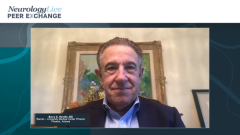
Guidance on COVID-19 Vaccines for Patients With MS
Barry A. Hendin, MD, reviews guidance on COVID-19 vaccines for patients with MS, including highlights from the AAN position statement.
Episodes in this series

Ahmed Z. Obeidat, MD, PhD: We’ll transition to talking about the COVID-19 vaccine and MS [multiple sclerosis] treatment. None of these talks go without mentioning COVID-19. Sadly, we’re still in a pandemic. It’s improving, but it may be coming back also, so we don’t know. We’re always hopeful that one day we’ll go back to normal life and feel some normalcy. But when we talk about COVID-19 and MS treatment, vaccination in particular is a very important topic. Dr Hendin, I’m going to talk to you a little about the positions of the AAN [American Academy of Neurology], the National MS Society, and maybe even the MS Coalition. What’s the position on MS and vaccination for COVID-19? That’s a question that comes up all the time in the clinic.
Barry A. Hendin, MD: I’ll try to simplify it. One can get granular or at least a bit general. There’s a lot of consensus. The American Academy of Neurology, the Multiple Sclerosis Association of America [MSAA], the Consortium of MS Centers [CMSC], and the National MS Society have all had a consistent message. That is, No. 1, that with people with MS, just like the general population, we encourage vaccination. That means that with the FDA-approved groupings age-wise, we encourage vaccination. No. 2, it’s unlikely that the vaccinations will lead to a negative effect in MS relapse, etc. On the other hand, getting COVID-19 is a serious and too often fatal problem. All of these groups, including the American Academy of Neurology, the National MS Society, the Consortium of MS Centers, and the MSAA have all said to encourage vaccination, but that isn’t the end of it. Encourage vaccination, boosters, hand washing, masking, and avoidance of crowds.
What about the MS population in particular? Although having MS doesn’t in and of itself create a substantial risk difference, we know that MS with progressive disability, aging, and other comorbidities, like uncontrolled diabetes or kidney disease, can lead to worse outcomes. That’s all the more reason to be vigilant, vaccinated, and boosted after discussion with your clinician.
All of these discussions state that this is still ultimately a discussion between patients and clinicians. I agree with that, but it’s also a strong endorsement of vaccination, and I thoroughly agree. It also states that they took a dive into timing, and there’s some interest in the guidelines as to potential timing with B-cell depletion therapies and S1P [sphingosine-1-phosphate receptor] modulators. I understand the interest of timing. I’d love to have people vaccinated before they start their medications, but that isn’t always the case. I encourage vaccination. I tip my hat to timing, but much more so to getting the agent when it’s available.
Ahmed Z. Obeidat, MD, PhD: Yes. Thank you very much. This is very helpful. To your point, the message is that vaccination and the booster are recommended. All these organizations agreed on this, which speaks to the importance of this public health issue and the importance of fighting this infection and hopefully getting rid of it one day.
Transcript Edited for Clarity
Newsletter
Keep your finger on the pulse of neurology—subscribe to NeurologyLive for expert interviews, new data, and breakthrough treatment updates.














